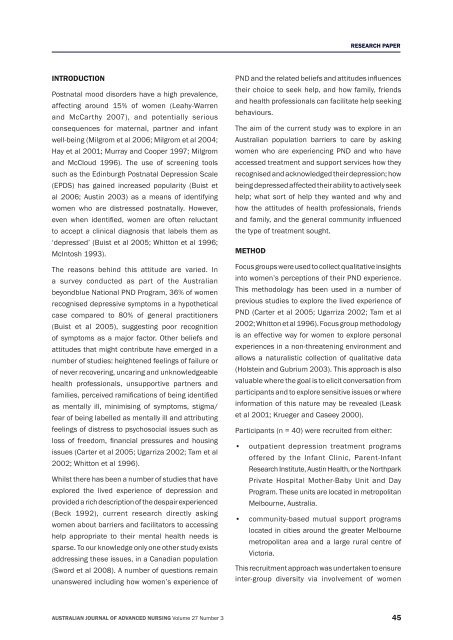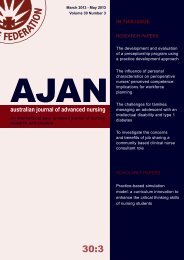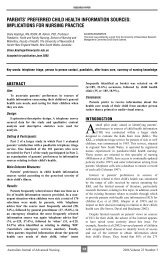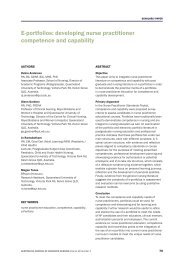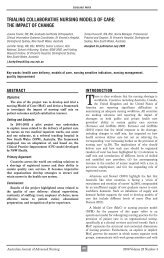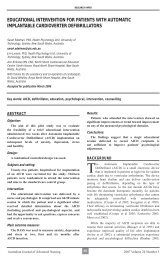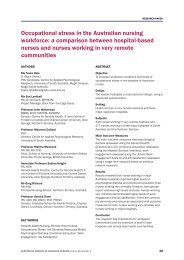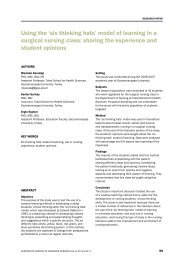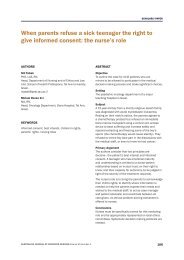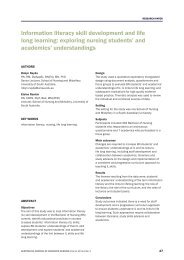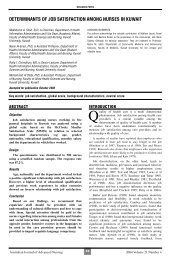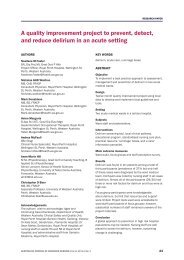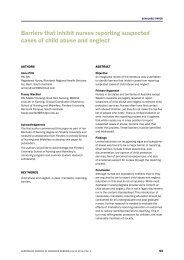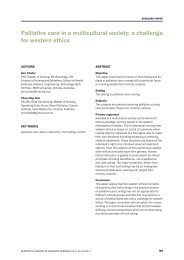March-May, 2010 - Australian Journal of Advanced Nursing
March-May, 2010 - Australian Journal of Advanced Nursing
March-May, 2010 - Australian Journal of Advanced Nursing
Create successful ePaper yourself
Turn your PDF publications into a flip-book with our unique Google optimized e-Paper software.
RESEARCH PAPER<br />
INTRODUCTION<br />
Postnatal mood disorders have a high prevalence,<br />
affecting around 15% <strong>of</strong> women (Leahy‐Warren<br />
and McCarthy 2007), and potentially serious<br />
consequences for maternal, partner and infant<br />
well‐being (Milgrom et al 2006; Milgrom et al 2004;<br />
Hay et al 2001; Murray and Cooper 1997; Milgrom<br />
and McCloud 1996). The use <strong>of</strong> screening tools<br />
such as the Edinburgh Postnatal Depression Scale<br />
(EPDS) has gained increased popularity (Buist et<br />
al 2006; Austin 2003) as a means <strong>of</strong> identifying<br />
women who are distressed postnatally. However,<br />
even when identified, women are <strong>of</strong>ten reluctant<br />
to accept a clinical diagnosis that labels them as<br />
‘depressed’ (Buist et al 2005; Whitton et al 1996;<br />
McIntosh 1993).<br />
The reasons behind this attitude are varied. In<br />
a survey conducted as part <strong>of</strong> the <strong>Australian</strong><br />
beyondblue National PND Program, 36% <strong>of</strong> women<br />
recognised depressive symptoms in a hypothetical<br />
case compared to 80% <strong>of</strong> general practitioners<br />
(Buist et al 2005), suggesting poor recognition<br />
<strong>of</strong> symptoms as a major factor. Other beliefs and<br />
attitudes that might contribute have emerged in a<br />
number <strong>of</strong> studies: heightened feelings <strong>of</strong> failure or<br />
<strong>of</strong> never recovering, uncaring and unknowledgeable<br />
health pr<strong>of</strong>essionals, unsupportive partners and<br />
families, perceived ramifications <strong>of</strong> being identified<br />
as mentally ill, minimising <strong>of</strong> symptoms, stigma/<br />
fear <strong>of</strong> being labelled as mentally ill and attributing<br />
feelings <strong>of</strong> distress to psychosocial issues such as<br />
loss <strong>of</strong> freedom, financial pressures and housing<br />
issues (Carter et al 2005; Ugarriza 2002; Tam et al<br />
2002; Whitton et al 1996).<br />
Whilst there has been a number <strong>of</strong> studies that have<br />
explored the lived experience <strong>of</strong> depression and<br />
provided a rich description <strong>of</strong> the despair experienced<br />
(Beck 1992), current research directly asking<br />
women about barriers and facilitators to accessing<br />
help appropriate to their mental health needs is<br />
sparse. To our knowledge only one other study exists<br />
addressing these issues, in a Canadian population<br />
(Sword et al 2008). A number <strong>of</strong> questions remain<br />
unanswered including how women’s experience <strong>of</strong><br />
PND and the related beliefs and attitudes influences<br />
their choice to seek help, and how family, friends<br />
and health pr<strong>of</strong>essionals can facilitate help seeking<br />
behaviours.<br />
The aim <strong>of</strong> the current study was to explore in an<br />
<strong>Australian</strong> population barriers to care by asking<br />
women who are experiencing PND and who have<br />
accessed treatment and support services how they<br />
recognised and acknowledged their depression; how<br />
being depressed affected their ability to actively seek<br />
help; what sort <strong>of</strong> help they wanted and why and<br />
how the attitudes <strong>of</strong> health pr<strong>of</strong>essionals, friends<br />
and family, and the general community influenced<br />
the type <strong>of</strong> treatment sought.<br />
METHOD<br />
Focus groups were used to collect qualitative insights<br />
into women’s perceptions <strong>of</strong> their PND experience.<br />
This methodology has been used in a number <strong>of</strong><br />
previous studies to explore the lived experience <strong>of</strong><br />
PND (Carter et al 2005; Ugarriza 2002; Tam et al<br />
2002; Whitton et al 1996). Focus group methodology<br />
is an effective way for women to explore personal<br />
experiences in a non‐threatening environment and<br />
allows a naturalistic collection <strong>of</strong> qualitative data<br />
(Holstein and Gubrium 2003). This approach is also<br />
valuable where the goal is to elicit conversation from<br />
participants and to explore sensitive issues or where<br />
information <strong>of</strong> this nature may be revealed (Leask<br />
et al 2001; Krueger and Caseey 2000).<br />
Participants (n = 40) were recruited from either:<br />
• outpatient depression treatment programs<br />
<strong>of</strong>fered by the Infant Clinic, Parent‐Infant<br />
Research Institute, Austin Health, or the Northpark<br />
Private Hospital Mother‐Baby Unit and Day<br />
Program. These units are located in metropolitan<br />
Melbourne, Australia.<br />
• community‐based mutual support programs<br />
located in cities around the greater Melbourne<br />
metropolitan area and a large rural centre <strong>of</strong><br />
Victoria.<br />
This recruitment approach was undertaken to ensure<br />
inter‐group diversity via involvement <strong>of</strong> women<br />
AUSTRALIAN JOURNAL OF ADVANCED NURSING Volume 27 Number 3 45


